Peter MALONE
Saturday, 18 September 2021 19:26
Call of the Wild, The
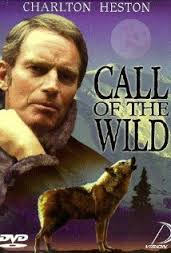
THE CALL OF THE WILD
US, 1972, 104 minutes, Colour.
Charlton Heston, Michele Mercier.
Directed by Ken Annakin
The Call of the Wild is a Jack London story of the North and has been filmed several times. A 30s adaptation starred Clark Gable and Loretta Young. An international remake starred Charlton Heston and was directed by action director Ken Annakin (Those Magnificent Men films, The Battle of the Bulge, Paper Tiger). This TV version is entertaining, directed very much to the home audience and focuses on the beautiful locations, a fair amount of action and the interaction between man and animal. An entertaining if very popularised version of the classic novel (although Charlton Heston blamed international lack of collaboration in production to make it the worst film he ever made).
A 1993 version starred Rick Schroder and Mia Sara.
Published in Movie Reviews
Published in
Movie Reviews
Tagged under
Saturday, 18 September 2021 19:26
Call Northside 777
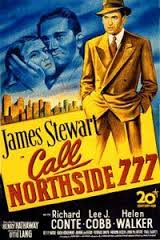
CALL NORTHSIDE 777
US, 1947, 111 minutes, Black and white.
James Stewart, Richard Conte, Lee J. Cobb, Helen Walker.
Directed by Henry Hathaway.
Call Northside 777 was a popular and important film of its day 20th. Century Fox commissioned a number of black and white thrillers in the mid '40s, taking current events and presenting them in a semi-documentary way. Henry Hathaway was the main director of these films which included The House on 92nd Street and 13 Rue Madeleine - both about World War Two and espionage. The Street With No Name and Kiss of Death took the genre into the area of the American thriller.
This film shows a newspaper reporter investigating a verdict of an old crime and proving a man imprisoned, innocent. The crisp documentary style retains interest and is reminiscent of the discussions by the jury in Twelve Angry Men. The film gains strength by James Stewart in the leading role and his sincerity as the reporter. Richard Conte is effective as the vindicated criminal. The film is entertaining and instructive and is a good example of Hollywood style of the mid '40s.
1. The quality of this film drama, its enjoyment value?
2. The use of black and white photography. documentary style, commentary, an atmosphere of realism, a case based on facts? This as background to audience response to the human values of the story, the fact of its realism? The qualities of this kind of semi-documentary picture?
3. The presentation of the role of a newspaper editor. his aims, push, influence in society? The film's delineation of the character of the editor, his pushing of McNeal?, his dedication to his job?
4. The presentation of the role of a journalist. his influence on society, the dedication to his work and its fulfilment for him?
5. The character of McNeal? Jams Stewart's portrayal? As a man in himself, his work as a reporter, his cynical attitudes? Attitude toward the assignment. his beginnings. the gradual involvement, his personality in the interviews? The details of the steps that he took,, his style in pursuing the course? The importance of his wife as a character and influencing his work?
6. How did his involvement gather momentum? His meeting with Wiecek, getting to like him. relating well to him? How did his involvement change his outlook on life? The detail of the vindication of his belief in Wiecek?
7. Audience response to Wiecek? Presumptions of his guilt, sympathy for him as a person, interest in the testing of his lying or truth e.g. with the lie detectors. the growing doubt about his guilt? The v-indication of his innocence and audience response to his being saved? The detailed characterisation of Wiecek?
8. The importance of Wiecek's mother, wife, family? Belief in him, doubt in him? over a period of eleven years? The effect of his imprisonment on all of them? Their involvement in saving him?
9. The film's insight into the work of American crime in the '30s and '40s, public reaction to crime, the influence of the media?
10. Themes of justice, legality, prison life, punishment?
11. The film's presentation of evidence, circumstantial evidence, lies, the truth?
12. How valuable the insights into processes, their effect on human beings? A humane document?
Published in Movie Reviews
Published in
Movie Reviews
Tagged under
Saturday, 18 September 2021 19:26
Call Me Madam
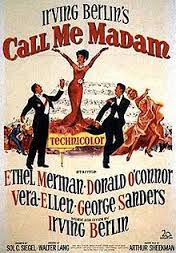
CALL ME MADAM
UK, 1953, 117 minutes, Colour. 20th.
Ethel Merman, Donald O'Connor, Vera- Ellen, George Sanders, Billy De Wolfe.
Directed by Walter Lang.
Call Me Madam was one of Irving Berlin's most popular musicals. Others include Alexander's Ragtime Band, Blue Skies, Annie Get Your Gun. The film is a vehicle for Ethel Merman with he particularly loud and brassy style. It works well here for this very American ambassadress. Donald O'Connor and Vera-Ellen? are good as singing and dancing partners. George Sanders handles a rather stiff musical comedy role with dignity and enjoyment. The film is set the post-World War II period under Harry Truman - and there are references to his daughter Margaret's musical career. The real-life Sally Adams was Mrs Pearl Mesta. An exuberant and tuneful musical and directed by Walter Lang, who directed so many musicals at 20th Century Fox.
1. The tradition of American musical comedies, style, appeal, conventions? Their continued popularity?
2. The film as an Ethel Merman vehicle? Her style and popularity? The other stars? The popularity of Irving Berlin over so many decades, lyrics and melodies? A singing musical, a dance musical?
3. The satiric comment in the date of 1951 and the two mythical countries? The American view of fading European aristocracy and their post-World War II needs? The mythical United States with its handouts? The story as a reflection of the Truman era? The film's comments on American generosity and loans? Satire?
4. Ethel Merman's personality, brash style as Sally Adams? A portrait larger than life? Her being very American, Oklahoma background and oil, not a snob, enjoying her opulent style, jovial with her parties? Becoming an ambassador, links with Harry Truman, the interview, the newsreel footage, her behaviour at the parties? A very American character?
5. The background of protocol, American ambassadors, the book of rules, the need for diplomacy? The innocent American abroad in Europe? Her mistakes? Maxwell and his being ever on guard, a traditional family and his critical attitude towards her?
6. Lichtenberg and its beauty, poor aristocracy, royal marriages, needs for loans, its old-world diplomacy and manners, Count Cosmo and his presence and the contrast with the rest of the Council? The ministers? The way of life, the modern shops and American songs, the protocol and Grand Balls, secret passages etc.? The fairytale aspects of Europe popular with the Americans?
7. Sally and Cosmo falling in love? As expressed through the songs, Sally's reaction to his kissing her hand, their various meetings? Maxwell poisoning her against him? Her wanting to help and making mistakes about his techniques for the loans? Cosmo and his Prime Ministership, resignation? Sally and her treatment of Maxwell, slap-happy attitude with the monarch, teaching them all the International Rag, helping Ken and his romance, her recall? The party when she returned and the happy ending and the reuniting? Fairy tale ingredients American style?
8. Ken and his job, interviews, ingratiating himself with Sally, helping her, falling in love with the Princess, the sadness of the impossible marriage, their meetings? His drinking and the comedy dance when he was drunk? The Princess and her place in State, the arranged marriage, her fiance's suspicions especially at the ball, the shop encounter, the secret passage, her forfeiting the throne? The happy ending?
9. The comic portrait of the ministers, of the Count and his wife, Maxwell and protocol, the happy and drinking and touring American Senators?
10. Pleasant entertainment, fairy tale ingredients American style, political satire?
Published in Movie Reviews
Published in
Movie Reviews
Tagged under
Saturday, 18 September 2021 19:26
Calling Bulldog Drummond
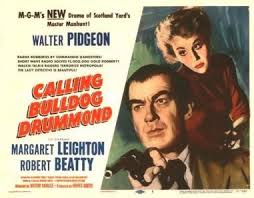
CALLING BULLDOG DRUMMOND
UK, 1951, 80 minutes, Black and white.
Walter Pidgeon, Margaret Leighton, Robert Beatty, David Tomlinson, Peggy Evans, Charles Victor, Bernard Lee, James Hayter.
Directed by Victor Saville.
Calling Bulldog Drummond is a small-budget MGM British feature of the early '50s. It is a star vehicle for Walter Pidgeon as Bulldog Drummond. He gets very interesting support from a British cast led by Margaret Leighton, Robert Beatty and David Tomlinson and includes such character actors as Bernard Lee and James Hayter.
There had been many Bulldog Drummond films and many Bulldog Drummonds, including Ronald Colman. The film is a usual investigation thriller - with a fair amount of action and suspense.
The film was directed by Victor Saville, who produced and directed a number of films ranging from the Rita Hayworth musical Cover Girl to the Mickey Spillane story I, The Jury.
1. Entertaining British crime investigation?
2. Black and white photography, English locations, editing and pace, special effects?
3. Bulldog Drummond as a popular character, investigator? Walter Pidgeon's interpretation?
4. The conventions of the gangster investigation film? The focus on Drummond, the activities of the gang (and their military organisation)? Drummond framed for cheating at cards, on the outer, becoming a member of the gang, the dangers of the infiltration, imprisonment, the escape? The showdown and the unmasking of the gang? The assistance of Helen Smith, her being in prison with him? Working together as a team?
5. The sketch of the gangster group, their activities, military precision? Personalities?
6. The presentation of the police, investigations, covers?
7. Routine action adventure - British style? 1950s style? But enjoyable of its kind?
Published in Movie Reviews
Published in
Movie Reviews
Tagged under
Saturday, 18 September 2021 19:26
Callie and Son
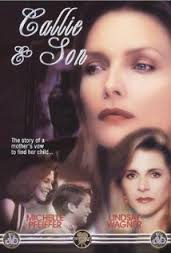
CALLIE AND SON
US, 1981, 97 minutes, Colour.
Lindsay Wagner, Dabney Coleman, Jameson Parker, Andrew Prine, Michelle Pfeiffer.
Directed by Waris Hussein.
Callie and Son is a very entertaining telemovie. It has the ingredients of popular soap opera and the tones of the bestseller. It spans three decades of a woman's life and highlights the American background of the period: the end of the war, Texas lifestyle in the '40s, the sophistication of the '50s, the changes and ambitions and wealth of Texas/Dallas in the Kennedy era, the disillusionment and protest of the '60s and '70s, the echoes of Watergate in
the '70s. Ultimately the film becomes something of a telemovie Dallas or Dynasty.
The film is acted very well, especially by Lindsay Wagner in the central role. The settings are convincing and the change of era well communicated. There is an excellent supporting role by as Callie's friend Jeannie. Direction is by Waris Hussein, director of a number of English films in the late '60s and early '70s including The Six Wives of Henry VIII. He made a number of telemovies, e.g. Divorce His, Divorce Hers, in England and in the United States. The film may be seen as first class soap opera - and also as an allegory of America in its post-war era.
1. The quality of the film as telemovie? Length, scope, impact? Entertainment? Impact on a home audience? Relationship to American dramas? Soap operas?
2. The range of time, characters, characterisation, period. issues and interests? Lindsay Wagner's skill in performance and holding the film together?
3. Callie and the atmosphere at the end of World War Two? Her being wronged? The girl from out of town? The child and her being tricked into giving it up? Her never being healed of this loss? The irony of her gentleness, her move to the city. her gradual development and push? The support of Jeannie? Opportunity and study? Her meeting of Bordeaux - in passing, marriage? The innocent and wounded girl and the American dream?
4. The change in the '40s and '50s? Her being spurned but her managing? The narrative of Kimberley Smyth and his support? Her sharing Bordeaux's experience, learning the paper, coping with society? Her pregnancy and losing her child? Her grief? Her moving to greater maturity but the continued wound with the loss of her child?
5. Bordeaux's finding her child for her? Her love for him? Her love for her husband? Her getting more and more involved in his work? Their lifestyle? Her bringing up Randy? Her growing possessiveness? Clashes with Bordeaux? obsessive mother? The change of the '60s with prosperity and yet fear, paranoia and the Kennedy assassination? Bordeaux and his moral collapse? Death? Callie clinging to what she had? The Dallas assassination experience and her becoming more defiant and powerful?
6. Randy getting older. experiencing the rebellion and dropout status of the late 1960s? Callie's pressures on him? His runaway marriage? Her work on the paper, ambitions for her son in politics - state level, federal level? Her defiance moving towards ambition? Her growing older and more experienced, controlling people, lacking scruple? Her transformation into a woman of power and evil?
7. Her being consumed with ambition for her son? Love-hate? The court case and her hypocrisy? The prison visit and Randy's knowledge of his mother's guilt? Audience response to the new birth and Callie's becoming a mother again? The ironic funereal car. her dress as she became a mother- and the comment that she would be obsessive again?
8. Callie and Randy and the importance of frustrated mother love throughout the film? Randy's unknown origins, his birth and his being taken away from his mother, legal contracts? His return to his mother and her discovery of him? The birthdays, her pampering? His father's death and its effect on him? The reasons for his dropping out? Adopting the rebellious lifestyles of the '60s? Vietnam issues, drugs, refusal to study, social protest and associations? His bargaining with his mother to study? To work on the paper - and the journalists' comments on his inabilities? Political background and his fighting for his place in government? His defying his mother? His memories of his stepfather? The plans for a politically advantageous marriage? His rebellious marriage? The brittle relationship with his wife? His exasperation with her and yet his love for her? Her past and the blackmail? The grounds for people's suspicion of his killing his wife? His behaviour in the court? His fears? The continued appeals and his mother's pushing these? His wanting to die? The final sequence with his mother and his love-hate-forgiveness? Young America, young post-war America, full of future and possibility stifled by mother's obsession and manipulation of power?
9. The character of Bordeaux: his visits to the cafe. the libel case and Callie acting as his secretary. the date. their friendship and warmth, the transition to the wedding and its social impact in Dallas, the social occasions and Bordeaux's love for his wife and supporting her, especially in the face of social criticism? His skill in his work, integrity? His response to Callie's losing the child? His search for Randy? His devotion to Randy? His supporting Callie? His wisdom in warning her and her disregard of it? His power in the press. in relation to Washington. with the Kennedys? The impact of the Dallas assassinations? His wanting to opt out? The symbol of his own assassination and the futility of his death? The symbol of American integrity being assassinated?
10. Kimberley and his friendship, support, cynicism about Dallas society and his explanation of people and their origins and pretensions? His being present for Callie? Love for her. helping her, knowing the truth about her?
11. Jeannie and her friendship? A vivid portrayal of friendship? Style, manner, boisterousness? Helping Callie move out into society? The touching sequence of receiving the telegram about the death of her husband? Her marrying into society and enjoying the company of her husband? His death - her sadness, Callie's visit? Her working on the paper and answering questions? Her support of Callie during the trial? A vivid sketch of an American type?
12. The range of presentation of American society: the initial hospital sequence and staff, the law and shady practices. especially as regards adoption? Dallas and Jeannie and the landlady? Work at the cafe? Callie's study as a stenographer and her teachers? The people involved in the libel case? Dallas society and the stories of frontier life and the changes in status, wealth and hypocritical values? The world of newspapers, government? Power? Protestors? The Presidency?
13. The film's Dallas setting and Dallas as a symbol of post-war United States?
14. Randy's wife and her past, marriage, the motel sequences and Callie's handling of it? Her subdued behaviour? The blackmail? Her standing up to Callie and the cruelty of her death?
15. Audience response to the change in Callie - initial sympathies and understanding, hesitation about her obsession, disgust and revulsion at her violence and lies?
16. A film of insight - into the American woman as woman, mother, wife? Love, needs, possession. obsession? Hurt? Ambition? Power. life and death? Still waters running deep?
17. The film as an allegory of the United States from the '40s to the '80s?
Published in Movie Reviews
Published in
Movie Reviews
Tagged under
Saturday, 18 September 2021 19:26
Cesar and Rosalie
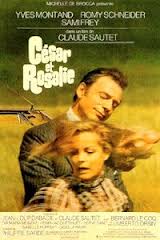
CESAR AND ROSALIE
France, 1972, 105 minutes, Colour.
Yves Montand, Romy Schneider, Sami Frey, Umberto Orsini, Eva Maria Meincke.
Directed by Claude Sautet.
There is a French tradition in recent years of light, lush-coloured romances with emotional clashes and a lot of time spent in cars; A Man and A Woman may have started it. Claude Sautet, who also made one of these films in 1969, The Things of Life, now offers this one. The film shows, one thinks, a true enough picture of confusion and suffering in emotional growing-up and that romance is ultimately rather unromantic. The strength of this film lives in Yves Montand's most genial performance as the likeable, but still adolescent, Cesar. He makes the emotional entanglements seem real. Romy Schneider is an attractive Rosalie.
1. How attractive a romantic story was this? Why so attractive? Why enjoyable? How real were the people and their situations? How humane a film? How sophisticated? Did it need a sophistication in the audience? Why? The emotional response to films like this? The use of colour, locations, cars, music, fashions?
2. Could this be described as a woman's story? Was it made for women or men predominantly? Or both? How much depth was there in the story? How much an attractive and interesting presentation of services? Which sequences would illustrate this best?
3. Who was the central character of the film? How would the answer to this question alter the perspective of the film? The way that men and women would identify with the characters differently? The differing response to the crises? Is this important?
4. How attractive was Rosalie? Romy Schneider's style and performance, how likeable, how real? Her searching for love and fulfilment? The background of her love for David, the impact of his return. her visit to his studio, her enjoyment of his presence? The contrast with Antoine and her marriage to him? The intensity of her love for her daughter? Her relationship with Cesar? Did she love him? What attracted Rosalie to Cesar, his vitality, care? The significance of her mother's wedding and the reception,. her pride in Cesar's presentation of himself? Her patience during their card game etc.? Why did her attitudes change, her disgust with Cesar and his wrecking the studio? why did she pine at the seaside? The impact of the return of David? Why did she finally walk out on them? Was it too much for her? Why then ultimately return?
5. How attractive was Yves Montand's performance as Cesar? His vitality and the details of this as presented on a screen? The self-made businessman? His push and personality, genial humour moodiness his gauche way of doing things? His pride in his masculinity? His attachment to Rosalie - was it love? His surprise when she went back to David? His exasperation in wrecking the studio? Should he have tried to force her to love him? Why did she take David back? The quality of the bond that grew between them? The sequences after Rosalie's departure? His surprise at Rosalie’s return? Why had he gone off in his business after her departure?
6. Was David as well portrayed as Cesar and Rosalie? Did he seem reel? An artist? The power of his hold over Rosalie, the reason for his departure, his love for her? Did the film sufficiently show him at work with his art, as a contrast to Cesar? His admiration for Cesar at the wedding reception? Why did he agree to go to the beach to help Rosalie? The effect of her leaving on him? What was it in him that appealed to Cesar? Why did they become such friends? His reaction to Rosalie’s return?
7. How important were the other characters in the film - Antoine and his discussion with David about his marriage, David's friends and their work in the cartoons, Rosalie’s mother and her attitude towards marriage and remarriage. her fuss, place in society etc.? The rest of the family and their links with one another, at the beach, the discussion about deaths in the family and their effect? How valid a picture of middle class society in France was this?
8. Comment on the director's use of detail to communicate the verve of life, the reality of his situations. and to help audiences identify?
9. How well-probed were the problems of modern living? Sophisticated living, relationships and pain, love? A world which is respectable and conventional? With middle class values?
10. Was the linking narrative device helpful for the film or did it change the tone? Was it meant to?
11. How successful and entertaining a film was this? Its quality as a romantic entertainment?
Published in Movie Reviews
Published in
Movie Reviews
Tagged under
Saturday, 18 September 2021 19:26
Centennial Summer
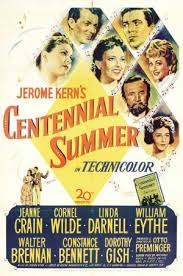
CENTENNIAL SUMMER
US, 1946, 102 minutes, Colour.
Jeanne Crain, Cornell Wilde, Linda Darnell, William Eythe, Walter Brennan, Constance Bennett, Dorothy Gish.
Directed by Otto Preminger.
Centennial Summer is a pleasant, now dated, musical. It reflects the cinema-styles of the leisurely mid forties - it might be compared with the Rogers and Hammerstein State Fair, also starring Jean Crain at this time. The centennial of American Independence is the setting, Philadelphia the city. The picture of American family life, romance and romantic dreams, misunderstandings have been the staple of this kind of film over the decades.
The young stars are attractive and were popular at twentieth century fox at the time. Walter Brennan, bearded, has a less raucous role then usual - and sings. So does Dorothy Gish. Constance Bennett has an enjoyable time as a worldly-wise aunt. Colour is attractive, the period also. Direction is by Otto Preminger - he had made Laura and Fallen Angel and started on a career of some success. The black minstrel singer and the children towards the end reminds us that he was to direct Carmen Jones and Porgy and Bess. The Jerome Kern score has not proved memorable. An example of popular Americana of the forties.
1. A pleasing piece of Americana? Musical comedy? Its entertainment value in the '40s? Now?
2. Colour photography, period, Philadelphia? Decor, costumes? Jerome Kern's score?
3. The atmosphere of the 1876 Centennial? The stressing of American Independence and traditions, the accent on the modern world? Picture of an American family, work, the city, romance?
4. The contribution of the songs, the dancing? The placing of the songs? The lyrics relating to characters, situations? The addition of the negro dance routine at the end? The mood and style of the music?
5. The focus on the family, especially with Father and the President's address, which he could not hear? His work at the railways? His clock invention - and his working on it so long? His love for his wife? The children? The atmosphere of the Centennial? His difficulties with his job, clashes with his boss? The arrival Xenia - and his wife's jealousy? Xenia's helping him with interviews, with the job - and her final success? His love for his daughters, especially Julia? Friendship with Philippe? A picture of the 19th. century American father? Walter Brennan's style?
6. Julia as heroine? Strength, sweetness? The clashes with Edith? Love for her father? Knowing about his demotion? Working for Philippe to earn some money? Her falling in love with Philippe, working with him at the exhibition? The clash with Edith and the discussion about romantic games? Outmanoeuvred by Edith? Her upset. running away to her grandmother? The happy ending?
7. The contrast with Edith - spoilt. her place in the home, her teasing Ben? Her tantalising Julia and fighting with her? The manoeuvres with Philippe? The meal, the dance? Her jealousy? Her place at the show and the reconciliation with Ben - with the humour about her being possibly pregnant?
8. Cornel Wilde as Philippe - the dashing French style. presence in America, the Centennial and the Exhibition, his love for Julia, working with her, victim of Edith's games, his ambiguous behaviour, being hurt? The exhilaration of the exposition? The reconciliation and happy ending?
9. Ben as the ordinary American - in love with Edith, bewildered by her, joining with Julia in tactics. the solid American citizen at the end?
10. Xenia as the woman of the world? Her international style? Sweeping men off their feet? The discussions with Harriet about jealousy? Harriet's fantasies about Xenia taking her husband? The manoeuvres for the job and restoration? The clock?
11. The atmosphere of the Centennial, celebration, faith in American progress? Americana ?
12. Folksy, sentimental, charm? The happy ending?
Published in Movie Reviews
Published in
Movie Reviews
Tagged under
Saturday, 18 September 2021 19:26
Celeste
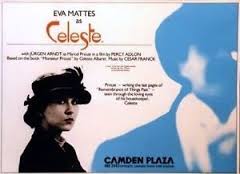
CELESTE
West Germany, 1981, 106 minutes, Colour.
Eva Mattes, Jurgen Arndt.
Directed by Percy Adlon.
Celeste is based on a book Monsieur Proust by Celeste Albaret, his housekeeper from 1914 until his death in 1922. The film is an intelligent portrait of the housekeeper and her devotion to Proust. It then becomes a portrait of Proust in his final years - the portrait of the artist as a meticulous, fernickety man.
The screenplay does not attempt to give a biography of Proust or analyse his creative genius. However, the screenplay is written with Proust's methods in mind. It is slow-moving, there is an attention (meditative) to detail situation, atmosphere. There is much static contemplation of character, object, time passing. There is much fluid movement with attention to minute detail. These attempts to capture the atmosphere of Proust's quest for time lost convey an atmosphere of the writer’s perception of life and its meaning. Much of the film is stylised, even Celeste's characterisation which is dignified, composed, compassionate - seeing her about the details of her housekeeping business, seeing her contemplating the author, sharing her fantasy about his death.
The film is certainly not to everybody's tastes - it runs the danger of being tedious. However, the film shows us something of the style of former times with the devotion of the housekeeper to her master, the artist (self-important) and his perception of a world that has now passed.
1. The film as a portrait? A portrait of Celeste? Portrait of Proust? The importance of observation, detail? The tone and quality of the production? Writing? Movement? Camera compositions? The type of response the film was eliciting - to characters to style, to meaning?
2. The qualities of the German production: the meticulous attention to detail in Proust's house. each of the rooms? To the atmosphere of Cabourg, by the sea? Decor, costumes? The contrast between interiors and exteriors? The claustrophobic atmosphere of the film - and of Proust's life and creative work? The outings as a relief? The film's comment on the period shaping Proust and Celeste? The irony of the background of World War One and its evidence and changing the 19th century into the 20th century?
3. The emphasis on style: silences, pauses, long contemplation of characters and objects? Long fluid movement sequences? Pace of editing? Interiors and lighting? Light and darkness? Close-ups and tracking? The audience sharing Celeste's experience and contemplation, her puzzlement? The invitation to probe Proust? The perception of the quality of his writing and insights? Classical score - and the use of the String Quartet in D by Cesar Franck and Proust's appreciation of it?
4. Observation and memory? Shifts of time.. shifts in attention? Memory throwing light on the present and the past? Memory and Proust's creative writing?
5. Celeste and her background? Manner and style? Her relationship with her husband Odilon? Her arrival, the background of the war, her learning Proust's lifestyle? Her self-sacrifice, attention to Proust, her own needs being moderate. her not being bored by the constant attention? Her apprehensiveness about Proust - her contemplation of his death? Her obedience? A portrait of devotion to Proust? Love for her husband? The importance of so many years devoted to Proust? The flashbacks - and the writing of her later memoir? Her contribution to Proust's final years?
6. The formality of the household, the nature of the duties? The use of names? Celeste's support for Proust? His health, illness? The coffee, the fumes, the pages and their being pasted together? The shared experiences? The dinner and the conversation with Cocteau and the Countess? The masochistic performance? The outings and fashion?
7. The spiritual quality of the household and its being sustained? Her spirituality sustaining her and Proust in his death? The experience of death, the portrait of death?
8. The portrait of Proust: as seen, in himself, the background of his career and success? his relationships? His writing? The routine? Illness? His ringing the bell (and not ringing the bell)? The coffee, the fits? The use of names? His dwelling in the past? Foibles? His studying the guests for characters? The prize, publishing, completing his work? The outing? The dinner with Cocteau and the Countess?
9. The interaction of creative genius with empathetic service and devotion?
10. The audience being invited to enter into Proust's world? Understanding and appreciating the portrait?
Published in Movie Reviews
Published in
Movie Reviews
Tagged under
Saturday, 18 September 2021 19:26
Cavaleur, Le
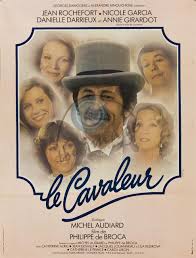
LE CAVALEUR
France, 1978, 100 minutes, Colour.
Jean Rochefort, Annie Girardot, Nicole Garcia.
Directed by Philippe de Broca.
Le Cavaleur is an interesting, entertaining, well made film about mid-life crisis. The film focuses on a very talented musician who is a selfish human being. He searches for the Eternal Woman. He sees himself as the great seducer - but lives in the past, almost ruins his life by imagining himself still young. In the central role, Jean Rochefort (who was the central actor in the Pardon Mon Affaire films) is excellent.
There is a very good group of French actresses in support, including Danielle Darrieux. The film was written and directed by Philippe de Broca. De Broca has made a lot of whimsical comedy adventures, especially those with Jean Paul Belmondo. In the late '70s he moved to films focusing on middle age and starring such actors as Philippe Noiret (the Dear Inspector films).
1. The work of Philippe de Broca? His comedies? Farcical action adventures? The change of focus from athletic hero to middle aged man in crisis? The change of pace?
2. French comedies and their appeal? Pictures of society, individuals within society? The 'Gallic touches'? Moral situations, perspectives? Humour? Solutions?
3. The focus on mid-life crisis? The hero rogue? The portrait of men and women? Roles? Stereotypes? Men and women and relationships, love, victims? Willing and unwilling victims?
4. The focus on Edouard? Jean Rochefort's presence, style, comic timing? melancholic appearance? Credible ladies' man, musical genius? The importance of music in his life? His life compared with various musical compositions? The performance of such compositions? His skill with his music, the recordings, tantrums? His hack work? His concerts? Need for a new direction? The devotion of his secretary - and her exasperation? Working with him for so long? The infatuation with Murielle? The plans for the ski trip? mix-ups? His love for his wife - taking her for granted, a basic fidelity to her? His dependence on his ex-wife Lucienne? His encounter with Suzanne and the memories of the past? His infatuation with Valentine? His devotion to his daughter? The emotional tangles? Playing one woman off against the other? Holidays with his wife? Trying to advise his daughter? The plans for Murielle? The decision to go away with Valentine? Ability to manage? Inability to cope? Phone calls, lies? His eventually being abandoned and having to face his life?
5. Marie-France? and her love for her husband? The background of their marriage and liaison, divorce? Home life and her suspicions? Children? The hoping for a good holiday? The holiday, the fishing? The lies? Leaving in the middle of the night? Her exasperation? Her love for Edouard, infatuation for him?
6. The comparison with Lucienne? The background of their marriage? Divorce? Edouard's interrupting her in the middle of the night for music? His cavalier manner with her husband? The holiday home and the visit? Clashes? His love for his daughter, fatherly feelings, trying to give advice? His moralising tone? His getting advice from Lucienne?
7. Murielle and the farce at the railway station, the snow plans? His opportunism? The visit to the chateau? Her being left on the train? Her work in the nightclub?
8. Suzanne and the chance encounter, the memories, the war? The mood of the evening? Edouard's memories, leaving? The contrast with her granddaughter? The nude bathing? His infatuation? Reliving the experience with her grandmother? The reality and unreality of the plans to elope? The plans for San Francisco? The decision not to go? The symbol of the mid-life crisis?
9. His secretary, the phone calls, the plans for the Russians and entertaining them, the files, the bookings for concerts?
10. Edouard and the details of his daily life, friends? Drinks, going to the country, the hiding away from everybody? The support of his friend in the country, training his bog with the piano? The recital? The possibility of his being creative with the boy? His work in the shop? His need to move away to reassess himself?
11. The family reunion? His daughter? Her love? Her going to Amsterdam and returning? The wedding photo? The possibility of starting again?
12. The melancholic tone of the farce? Presuppositions about marriage, fidelity? Roles of men and women? Behaviour? Morality? Regrets? Middle age and growing in wisdom?
Published in Movie Reviews
Published in
Movie Reviews
Tagged under
Saturday, 18 September 2021 19:26
Caught on a Train
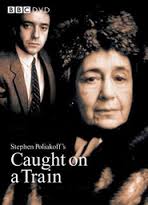
CAUGHT ON A TRAIN
UK, 1980, 80 minutes, Colour.
Michael Kitchen, Peggy Ashcroft.
Directed by Peter Duffell.
Caught on a Train is an entertaining British telemovie written by Steven Poliakoff, writer of many plays for the theatre. It has a strong cast led by Michael Kitchen and Peggy Ashcroft. The film won British Film Academy Awards for the drama for television as well as for Peggy Ashcroft as Best Actress in a Television Film.
A psychological drama, it has the atmosphere of train journey (with its echoes from many films) and European settings. The film is basically a two-hander between the two stars, yet it has a number of interesting supporting characters and is an interesting and entertaining duel of wits.
1. A British telemovie, cinematic style? The focus on situation and character? Psychological and a social atmosphere?
2. The European locations, the atmosphere of the train, the countries through which the train passed? Musical score?
3. Trains and their place in the film tradition? Dangerous journeys? Psychological confrontations on trains? Trains as a microcosm? Railway stations, the rails, the running of the train, carriages and compartments, the personnel working on the trains? A train life-style? The background of international thrillers, disaster films? This telemovie relying on that atmosphere for audience involvement
and response?
4. The basic situation, the station, the introduction to the characters? Peter and his arrival, the meeting of the girl? Space in the compartment? The rowdy tourists? The businessmen in the Club compartment? The arrival of Peggy Ashcroft? The dynamics of the journey?
5. The portrait of Peter: in himself, usually flying, his work as a publisher, going to Austria, ordinary, the friendship with the girl, attraction towards her, sharing perspectives, criticisms? His taking his seat, the window and the woman wanting it? Smoking and defying her? Going to sleep? The suspicions about the disappearance of her food? The corridor, the German students and their rowdiness? The Buffet car? The interaction with the old woman, his dislike of her, clashes, prejudice and suspicions? Her German and aristocratic background, his Nazi taunts? The English manner? The buffet and her behaviour and humiliation? Getting of at Frankfurt, her taking him to the Opera House for food, his hurrying back, the train absent, the wrong platform? The continuance of the journey? The dissatisfaction of his life? The beds and her tantrum? The ticket, the arrest and the police? His being allowed to go after the woman identified him? His dependence on her? Her offering to take him home? His reflection on his life? The journey of his life in the train? What happened to him?
6. The woman and her haughtiness, dress and manner, the question of the seat, the smoking, the food, her accusations, her imperiousness, walking over people, her explanation of her background, the Nazis, spoilt and her expectations? Being waited on? The buffet, the dirty table, the calling of the waiters? The Opera House, seeming to want him to miss the train, the return, the sleeping arrangements, her rescuing him from the police, the final confrontation? Her being about to die? The summing up of her life? Her confronting Peter's?
7. The girl and her American background, friendliness with Peter, her change of attitude, considering him too harsh towards the old woman? Giving her seat? The various men in the compartment, their types, the stealing of the food? The waiters and ticket-collectors? The people at the opera? The police and the interrogation?
8. The students, the violence and the attack, the blood in the wash-basin? The taunting of Peter?
9. Audience expectations about a train thriller? The response to the psychological interaction and drama? Insight into human nature?
Published in Movie Reviews
Published in
Movie Reviews
Tagged under